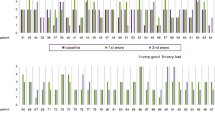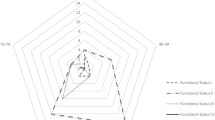Abstract
We identified patients with newly diagnosed rheumatoid arthritis (RA) in the ages 18–65 years who needed psychosocial interventions. A total of 123 patients (90 women) were asked to participate, but 19 declined and 4 dropped out early in the study, leaving a total of 100 patients (75 women) in the sample. Questionnaires used were the Epidemiological Investigation on Rheumatoid Arthritis study questionnaire, the Hospital Anxiety and Depression Scale, the Sense of Coherence (SOC) scale, and the General Coping Questionnaire. Interviews showed that 46% of the included 100 patients had psychosocial problems (PSP). One third of them had problems directly related to RA. The rest had problems with their life situation in general, without or reinforced by RA. Compared to patients without psychosocial problems, PSP patients lived in more strained social situations, especially regarding personal finances and social support. More of the PSP patients were anxious, showed lower SOC scores, and also used more emotion-based coping strategies (resignation, protest, isolation and intrusion) and less problem-oriented (minimization). They also had higher scores on depression and more frequently expected that RA would negatively affect their future. PSP patients also experienced a more negative impact of the disease, a finding not confirmed by the sickness activity score judged by the rheumatologist. Thus, early in the course of RA, screening instruments should be used to identify PSP patients. Psychosocial treatment and support by medical social workers skilled in RA care should be offered.
Similar content being viewed by others
References
Simonsson M, Bergman S, Jacobsson LT, Petersson IF, Svensson B (1999) The prevalence of rheumatoid arthritis in Sweden. Scand J Rheumatol 28(6):340–343
Soderlin MK, Borjesson O, Kautiainen H, Skogh T, Leirisalo-Repo M (2002) Annual incidence of inflammatory joint diseases in a population based study in southern Sweden. Ann Rheum Dis 61(10):911–915
Geuskens GA, Burdorf A, Hazes JM (2007) Consequences of rheumatoid arthritis for performance of social roles—a literature review. J Rheumatol 34(6):1248–1260
Morris A, Yelin EH, Wong B, Katz PP (2008) Patterns of psychosocial risk and long-term outcomes in rheumatoid arthritis. Psychol Health Med 13(5):529–544. doi:10.1080/13548500801927113
Dickens C, McGowan L, Clark-Carter D, Creed F (2002) Depression in rheumatoid arthritis: a systematic review of the literature with meta-analysis. Psychosom Med 64(1):52–60
Isik A, Koca SS, Ozturk A, Mermi O (2007) Anxiety and depression in patients with rheumatoid arthritis. Clin Rheumatol 26(6):872–878. doi:10.1007/s10067-006-0407-y
Sharpe L, Sensky T, Timberlake N, Ryan B, Brewin CR, Allard S (2001) A blind, randomized, controlled trial of cognitive-behavioural intervention for patients with recent onset rheumatoid arthritis: preventing psychological and physical morbidity. Pain 89(2–3):275–283
Zyrianova Y, Kelly BD, Gallagher C, McCarthy C, Molloy MG, Sheehan J, Dinan TG (2006) Depression and anxiety in rheumatoid arthritis: the role of perceived social support. Ir J Med Sci 175(2):32–36
Strating MM, Suurmeijer TP, van Schuur WH (2006) Disability, social support, and distress in rheumatoid arthritis: results from a thirteen-year prospective study. Arthritis Rheum 55(5):736–744. doi:10.1002/art.22231
Evers AW, Kraaimaat FW, Geenen R, Jacobs JW, Bijlsma JW (2003) Pain coping and social support as predictors of long-term functional disability and pain in early rheumatoid arthritis. Behav Res Ther 41(11):1295–1310
Curtis R, Groarke A, Coughlan R, Gsel A (2004) The influence of disease severity, perceived stress, social support and coping in patients with chronic illness: a 1 year follow up. Psychol Health Med 9(4):456–475
Doeglas DM, Suurmeijer TP, van den Heuvel WJ, Krol B, van Rijswijk MH, van Leeuwen MA, Sanderman R (2004) Functional ability, social support, and depression in rheumatoid arthritis. Qual Life Res 13(6):1053–1065
Soderlin MK, Hakala M, Nieminen P (2000) Anxiety and depression in a community-based rheumatoid arthritis population. Scand J Rheumatol 29(3):177–183
Groarke A, Curtis R, Coughlan R, Gsel A (2004) The role of perceived and actual disease status in adjustment to rheumatoid arthritis. Rheumatology (Oxford) 43(9):1142–1149. doi:10.1093/rheumatology/keh262keh262
Curtis R, Groarke A, Coughlan R, Gsel A (2005) Psychological stress as a predictor of psychological adjustment and health status in patients with rheumatoid arthritis. Patient Educ Couns 59(2):192–198. doi:10.1016/j.pec.2004.10.015
Lazarus RS, Folkman S (1984) Stress, appraisal and coping. Springer, New York
Treharne GJ, Lyons AC, Booth DA, Kitas GD (2007) Psychological well-being across 1 year with rheumatoid arthritis: coping resources as buffers of perceived stress. Br J Health Psychol 12(Pt 3):323–345. doi:10.1348/135910706X109288
Covic T, Adamson B, Hough M (2000) The impact of passive coping on rheumatoid arthritis pain. Rheumatology (Oxford) 39(9):1027–1030
Antonovsky A (1993) The structure and properties of the sense of coherence scale. Soc Sci Med 36(6):725–733
Schnyder U, Buchi S, Morgeli H, Sensky T, Klaghofer R (1999) Sense of coherence—a mediator between disability and handicap? Psychother Psychosom 68(2):102–110
Buchi S, Sensky T, Allard S, Stoll T, Schnyder U, Klaghofer R, Buddeberg C (1998) Sense of coherence—a protective factor for depression in rheumatoid arthritis. J Rheumatol 25(5):869–875
Treharne GJ, Kitas GD, Lyons AC, Booth DA (2005) Well-being in rheumatoid arthritis: the effects of disease duration and psychosocial factors. J Health Psychol 10(3):457–474. doi:10.1177/1359105305051416
Astin JA, Beckner W, Soeken K, Hochberg MC, Berman B (2002) Psychological interventions for rheumatoid arthritis: a meta-analysis of randomized controlled trials. Arthritis Rheum 47(3):291–302. doi:10.1002/art.10416
Dixon KE, Keefe FJ, Scipio CD, Perri LM, Abernethy AP (2007) Psychological interventions for arthritis pain management in adults: a meta-analysis. Health Psychol 26(3):241–250. doi:10.1037/0278-6133.26.3.241
Klareskog L, Nordmark B, Lindblad S (2001) On the organization of an early arthritis clinic. Best Pract Res Clin Rheumatol 15(1):1–15. doi:10.1053/berh.2000.0122
Gadd AS (1982) Social content of medical care. A guide [Socialt innehåll i sjukvården. En vägledning: in Swedish]. Utbildningsproduktion, Malmö
Bengtsson C, Theorell T, Klareskog L, Alfredsson L (2009) Psychosocial stress at work and the risk of developing rheumatoid arthritis: results from the Swedish EIRA study. Psychother Psychosom 78(3):193–194. doi:10.1159/000209351
Rane K, Wajngot A, Wandell PE, Gafvels C (2011) Psychosocial problems in patients with newly diagnosed diabetes: number and characteristics. Diabetes Res Clin Pract. doi:10.1016/j.diabres.2011.05.009
Zigmond AS, Snaith RP (1983) The hospital anxiety and depression scale. Acta Psychiatr Scand 67(6):361–370
Lisspers J, Nygren A, Soderman E (1997) Hospital anxiety and depression scale (HAD): some psychometric data for a Swedish sample. Acta Psychiatr Scand 96(4):281–286
Pincus T, Griffith J, Pearce S, Isenberg D (1996) Prevalence of self-reported depression in patients with rheumatoid arthritis. Br J Rheumatol 35(9):879–883
Covic T, Pallant JF, Tennant A, Cox S, Emery P, Conaghan PG (2009) Variability in depression prevalence in early rheumatoid arthritis: a comparison of the CES-D and HAD-D Scales. BMC Musculoskelet Disord 10:18. doi:10.1186/1471-2474-10-18
Siosteen A, Kreuter M, Lampic C, Persson LO (2005) Patient-staff agreement in the perception of spinal cord lesioned patients' problems, emotional well-being, and coping pattern. Spinal Cord 43(3):179–186
Gafvels C, Wandell PE (2006) Coping strategies in men and women with type 2 diabetes in Swedish primary care. Diabetes Res Clin Pract 71(3):280–289
Gafvels C, Wandell PE (2007) Coping strategies in immigrant men and women with type 2 diabetes. Diabetes Res Clin Pract 76(2):269–278
Prevoo ML, van 't Hof MA, Kuper HH, van Leeuwen MA, van de Putte LB, van Riel PL (1995) Modified disease activity scores that include twenty-eight-joint counts. Development and validation in a prospective longitudinal study of patients with rheumatoid arthritis. Arthritis Rheum 38(1):44–48
Ekdahl C, Eberhardt K, Andersson SI, Svensson B (1988) Assessing disability in patients with rheumatoid arthritis. Use of a Swedish version of the Stanford Health Assessment Questionnaire. Scand J Rheumatol 17(4):263–271
Bjork M, Trupin L, Thyberg I, Katz P, Yelin E (2011) Differences in activity limitation, pain intensity, and global health in patients with rheumatoid arthritis in Sweden and the USA: a 5-year follow-up. Scand J Rheumatol. doi:10.3109/03009742.2011.594963
Dougados M, Aletaha D, van Riel P (2007) Disease activity measures for rheumatoid arthritis. Clin Exp Rheumatol 25(5 Suppl 46):S22–S29
Evers AW, Kraaimaat FW, Geenen R, Jacobs JW, Bijlsma JW (2002) Longterm predictors of anxiety and depressed mood in early rheumatoid arthritis: a 3 and 5 year followup. J Rheumatol 29(11):2327–2336. doi:0315162X-29-2327
Brown GK, Nicassio PM (1987) Development of a questionnaire for the assessment of active and passive coping strategies in chronic pain patients. Pain 31(1):53–64
Barton JL, Imboden J, Graf J, Glidden D, Yelin EH, Schillinger D (2010) Patient–physician discordance in assessments of global disease severity in rheumatoid arthritis. Arthritis Care Res (Hoboken) 62(6):857–864. doi:10.1002/acr.20132
Runesson I (2005) Life, work and change. The first years with chronic rheumatoid arthritis [Liv, arbete och förändring. De första åren med kronisk ledgångsreumatism; in Swedish with English summary]. In: HAREC, Department of health, caring science and societyed. University Hospital MAS, pp. 248
acknowledgments
This study was supported by grants from the Swedish Rheumatism Association and the Norrbacka-Eugenia Foundation. Special thanks to Professor Lars Klareskog at the Department of Rheumatology at Karolinska University Hospital and Professor Lars Alfredsson at the Institute of Environmental Medicine Karolinska Institutet for access to important data from the EIRA study. Special thanks also to Scientific Editors Kimberly Kane and Stella Papadopoulou at the Center for Family and Community Medicine and M Sci Maria Flink at the Department of Social Work, Karolinska University Hospital for their valuable assistance.
Disclosures
None.
Author information
Authors and Affiliations
Corresponding author
Rights and permissions
About this article
Cite this article
Gåfvels, C., Hägerström, M., Nordmark, B. et al. Psychosocial problems among newly diagnosed rheumatoid arthritis patients. Clin Rheumatol 31, 521–529 (2012). https://doi.org/10.1007/s10067-011-1894-z
Received:
Revised:
Accepted:
Published:
Issue Date:
DOI: https://doi.org/10.1007/s10067-011-1894-z




